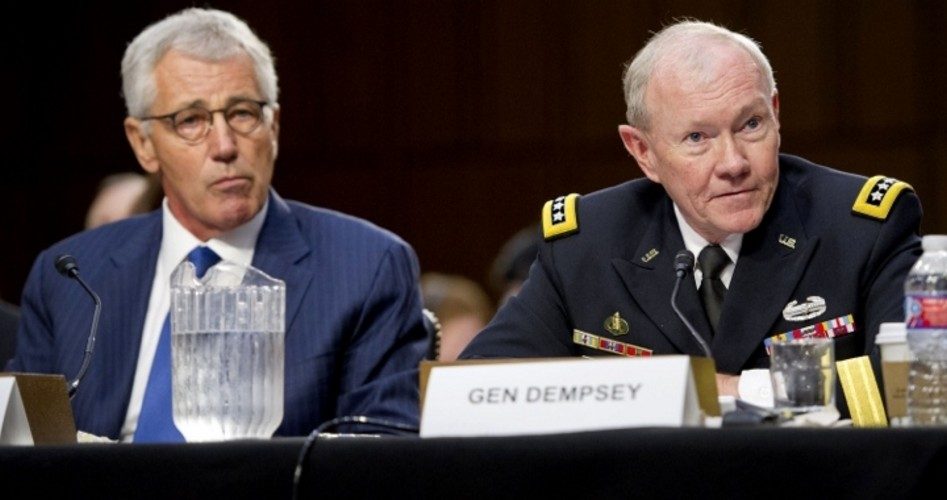
Speaking before the Senate Armed Services Committee on September 16, the nation’s two top defense officials, Defense Secretary Chuck Hagel (shown, left) and Chairman of the Joint Chiefs of Staff Gen. Martin Dempsey (shown, right), presented a less-than-optimistic prospect of success for the Obama administration’s new strategy to defeat the Islamic State in Iraq and Syria (ISIS). (The Obama administration prefers to use ISIL, for Islamic State of Iraq and the Levant.)
A report from the McClatchy Washington Bureau carried by the Miami Herald noted that Hagel and Dempsey outlined a list of hurdles any U.S. plan needs to overcome to defeat ISIS, including uncertainty that Iraqi military forces can be reconstituted to become an effective force against ISIS, as well as uncertainty that a U.S.-trained Syrian force will make fighting ISIS a higher priority than fighting the government of Syrian President Bashar al-Assad.
Furthermore, noted the report, we cannot even count on the administration’s pledge that no American soldiers will engage in ground combat operations. Dempsey said he could foresee circumstances where U.S. advisors would join Iraqi troops, for example, if the militants tried to recapture Mosul, in what he called “close combat advising.”
“If we reach the point where I believe our advisers should accompany Iraqi troops on attacks against specific targets, I will recommend that to the president,” Dempsey told the committee.
Dempsey’s statement prompted President Obama to expand on the point when he addressed troops at MacDill Air Force Base in Tampa on September 17: “The American forces do not and will not have a combat mission.”
Obama said U.S. troops “will support Iraqi forces on the ground as they fight for their own country against these terrorists.”
But, he added, “As your commander in chief, I will not commit you and the rest of our armed forces to fighting another ground war in Iraq.”
The statement made by Secretary Hagel to the committee said:
The Defense Department’s civilian and military leaders are in complete agreement that the United States and our allies and partners must take action against ISIL, and that the President’s strategy is the right approach.
However, as President Obama has repeatedly made clear, American military power alone cannot eradicate the threats posed by ISIL to the United States, our allies, and our friends and partners in the region. Iraq’s continued political progress toward a more inclusive and representative government — and its program of reform and reconciliation — will be critical. We believe that Iraq’s new Prime Minister, Haider al-Abadi is committed to bringing all Iraqis together against ISIL. To support him and the Iraqi people in their fight, the coalition will need to use all its instruments of power — military, law enforcement, economic, diplomatic, and intelligence — in coordination with countries in the region.
Hagel went on to outline the number of Americans committed to various missions in Iraq and summed it up by stating: “By the time all these forces arrive, there will be approximately 1,600 U.S. personnel in Iraq responding to the ISIL threat. But, as the President said last week, ‘American forces will not have a combat mission.’”
The secretary also made an interesting comment regarding the Assad regime in Syria:
As we pursue this program, the United States will continue to press for a political resolution to the Syrian conflict resulting in the end of the Assad regime. Assad has lost all legitimacy to govern, and has created the conditions that allowed ISIL and other terrorist groups to gain ground and terrorize and slaughter the Syrian population. The United States will not coordinate or cooperate with the Assad regime. We will also continue to counter Assad through diplomatic and economic pressure.
The administration, apparently, is now claiming that the rise to power of the ISIS/ISIL is Assad’s fault! This ignores the fact that it was U.S. aid to the rebels fighting Assad, some of which were allied with ISIS, that enabled the terrorist group to grow strong enough to overrun a sizable portion of Iraq. As The New American noted on August 14:
U.S. officials admit that many of the weapons being used by the Islamic State terrorists to butcher Christians, Shias, and other Iraqis were actually paid for by U.S. taxpayers before being seized by the rampaging barbarians. Before that, other American weapons now in the hands of those terrorists were acquired in Syria, where the Obama administration and its allies were fomenting and supporting “jihad” in a half-baked plan to overthrow the anti-ISIS Assad dictatorship. Some analysts even said Obama has “switched sides” in the terror war.
Unwilling to admit its responsibility in helping to arm ISIS, the administration would rather blame Assad, who has replaced Saddam Hussein as the Middle East scapegoat of the year.
Hagel’s remarks quoted above stated: “We believe that Iraq’s new Prime Minister, Haider al-Abadi is committed to bringing all Iraqis together against ISIL.” However, speaking to AP on September 17, al-Abadi opposed the idea of the United States or other nations sending ground forces to Iraq to help fight the Islamic State militants, saying that foreign troops are “out of the question.”
“Not only is it not necessary,” he said, “We don’t want them. We won’t allow them. Full stop.” “The only contribution the American forces or the international coalition is going to help us with is from the sky,” al-Abadi said. “We are not giving any blank check to the international coalition to hit any target in Iraq.”
While the United States has ruled out any cooperation with Syria’s Assad in fighting the ISIS, al-Abadi does not seem to regard Assad as the bogeyman that the United States does: “We cannot afford to fight our neighbor, even if we disagree on many things,” he said. “We don’t want to enter into problems with them. For us sovereignty of Syria is very important.”
One of the most outspoken opponents to U.S. military action in Iraq since the days when the Bush administration initiated the invasions of the country, was former Rep. Ron Paul. Though now retired from Congress, Paul continues to make his views known. On September 15 news commentator Erin Ade of RT asked Paul, “Should the president take on ISIS in Iraq? I mean, does ISIS represent a clear and present danger to America?”
Paul replied:
No, absolutely not. It’s a foolish thing. It was foolish when we got involved in 1990-91; it was foolish in 2003 when we expanded it and invaded [Iraq], and the bombing in-between killing hundreds of thousands of Iraqis. It’s time to quit, and time to say that it’s not working….
I would say it’s a bad deal. It’s bad for our national sovereignty. It doesn’t make us safer. It makes things more dangerous. It’s very costly. It sets the stage for an undermining of our civil liberties at home.
Paul also presented his recommendation to end the ISIS threat:
If you don’t like ISIS, just walk away and Syria and Iran will take care of them and they’ll get rid of all the radicals just as Saddam Hussein did. There was no al-Qaeda in Iraq [when Hussein was president] and there is no al-Qaeda in Iran.
Photo of Defense Secretary Chuck Hagel and Joint Chiefs Chairman Martin Dempsey: AP Images
Related articles:
Obama Issues “No Ground Troops” Flip-Flop
Obama Helped ISIS in Syria, Now Fights It in Iraq
Airstrikes Alone Won’t Defeat ISIS, Kerry Says
O, Mighty ISIS? The Cost of Fighting the Counterfeit Caliphate
Iran’s Revolutionary Guards Fighting ISIS in Iraq
ISIS Beheads American Journalist, Threatens Strike on America
Obama Helped ISIS in Syria, Now Fights It in Iraq
ISIS Terrorists Threaten American Pastor Imprisoned in Iran
Obama Promises to do to ISIS What He Did to Al-Qaeda
Lawmakers Slam Obama for Skirting Congress, Constitution on ISIS

